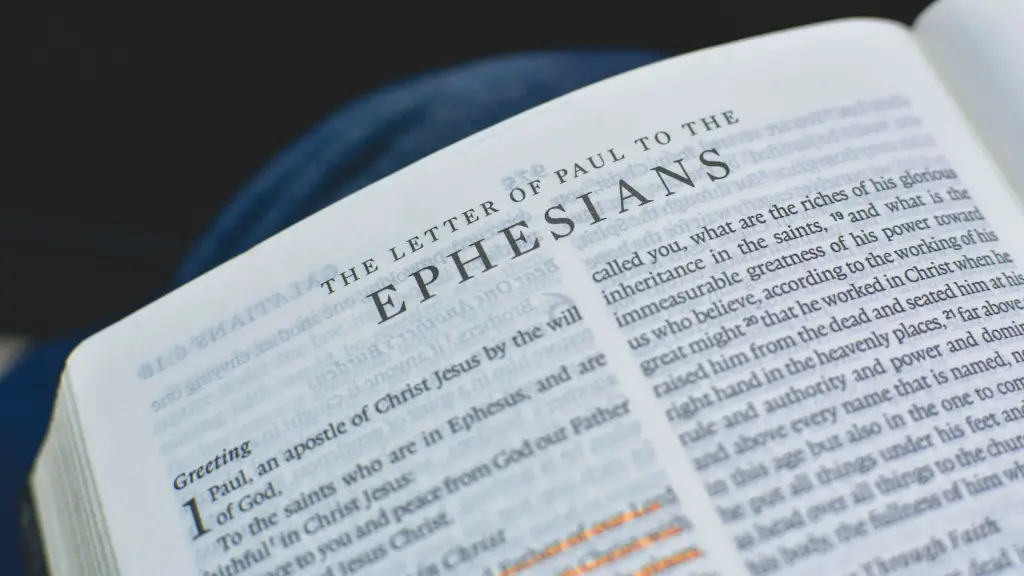Where Is Thessalonica In The Bible
Thessalonica, now called Thessaloniki, was an ancient Greek city located in the region of Macedonia. Today, it is a popular tourist destination located on the Aegean Sea in northern Greece and is the second-largest city in the country. Although Thessalonica has a long and rich history, it is most often noted for its essential role in the Bible. So where exactly is Thessalonica in the Bible?
To answer this, we need to look at the Bible’s New Testament. The book of Acts, which records the history of the early Christian Church, refers to Thessalonica nine times. Acts 17 is the most frequently quoted and mentions Paul of Tarsus and his companions, Silas and Timothy, traveling to Thessalonica to bring the message of Christianity. In Acts, they reasoned with the Jews in the synagogue and encouraged people to convert to Christianity.
The Bible also mentions Thessalonica when referring to an important letter written by Paul. His first epistle, commonly referred to as I Thessalonians, was written to the church in Thessalonica and is the earliest example of Christian letters in the Bible. Scholars believe it was written shortly after Paul and his companions left Thessalonica for Beroea.
Thessalonica is again mentioned in the Bible in the second letter from Paul to the Thessalonians, or II Thessalonians, which was written to encourage and strengthen the faith of the young church in Thessalonica. This letter was written circa AD 52-53 and gives advice on how to address the issues and difficulties of the day, such as social disorder and persecution. In this letter, Paul also encourages Christians to remain steadfast in their faith and obey the laws of the land.
A third letter from Paul to the Thessalonians, which is sometimes referred to as III Thessalonians, is mentioned as well. This is not found in the Bible and is classified as a pseudepigrapha. These letters were written to the church in Thessalonica and are thought to have been written in the early AD 50s.
Thessalonica was a major Roman trading port and was a thriving city in biblical times. It was the capital of Macedonia and an important center for the Christian Church in the Roman Empire. The city was heavily affected by political and social turbulence, as well as religious persecution, and this is why it is mentioned in the Bible.
Paul’s preaching in Thessalonica
Thessalonica was a significant city for Paul’s early mission. It is mentioned in the New Testament book of Acts when he visits the city for three weeks with Silas, Timothy and Luke. It was in Thessalonica where Paul first preached his gospel to the Jews, persuading a large number of them to become followers of Jesus. The news of Paul’s success spread throughout the city and caused a great commotion. This resulted in the Jews arresting Paul and Silas and taking them to a court without trial.
Paul was allowed to go to another city, Berea, and continue his evangelistic mission. The Jews in Berea seemed to be more open to listening to Paul’s message, and a large number of them believed in what he was preaching. Some of the Jews from Thessalonica became jealous of this and followed Paul to Berea. They stirred up trouble and accusations against Paul and caused the local rulers to have him sent away.
After this incident, Paul left Thessalonica and sent Timothy back to check on the church there. Timothy reported back to Paul that the Christians in Thessalonica had been greatly encouraged by his message and were standing firm in their faith even though they faced great opposition. Paul was very pleased by this news and sent a letter of encouragement and comfort to the church known as I Thessalonians.
Thessalonica in the ancient world
Archaeological evidence reveals that Thessalonica has been inhabited since ancient times. It was one of the main cities of Greece from its founding around 315 BC when it was named Taporea after its first ruler. The city was conquered and renamed Thessalonica by Cassander, who assumed rule over Macedonia in 316 BC. It was one of the important cities in the ancient world and was frequently visited by Alexander the Great who had a great impact on the region.
Thessalonica was first mentioned in the Bible in the book of Acts when it was called Tarsus. The city was described as a beautiful and bustling metropolis and was a major center of commerce and trade. People of different religions and cultures lived there, but most importantly it was a major hub for the spread of the gospel. Paul’s mission to Thessalonica was a defining moment in the history of Christianity and helped the religion to spread throughout the ancient world.
Thessalonica was also an important city in the early history of the Byzantine Empire. When the pagan Roman Empire became Christian, Thessalonica became an important center of theological thought and study. It was also an important center of learning and culture, and boasted a library and school of rhetoric. The city was frequently visited by the Roman emperors and other dignitaries and was a thriving city for centuries until it was conquered by the Turks in 1430.
The importance of Thessalonica in the Bible
Thessalonica is mentioned nine times in the New Testament, making it one of the most notable cities in early Christian history. It was here that Paul preached his first gospel, laying the foundation of the early Christian Church. He wrote two letters to the Christians of Thessalonica, encouraging them to stand firm in their faith and remain faithful in the face of persecution. Thessalonica was an important city in the ancient world and was pivotal in the spread of Christianity.
Thessalonica was an important center of commerce and trade, and it was frequented by different cultures, religions and people from all over the ancient world. This made it an ideal place for Paul to preach and spread his message. Even though Paul was eventually sent away, the impact he had on Thessalonica was undeniable and it is still remembered in the Bible today.
The legacy of Thessalonica
Today, Thessalonica, now called Thessaloniki, is a major city and port in Greece and continues to be a center of culture and learning in Europe. It is home to the largest university in Greece, Aristotle University, which boasts one of the oldest medical schools in Europe. The city is also renowned for its art, music and theater. However, the legacy of Thessalonica reaches far beyond its physical city borders. Its importance in the Bible is an enduring reminder of the important role the city played in the development of the Christian faith.
The role of Thessalonica in modern Christianity
Thessalonica continues to be a major center of Christianity in the modern world. It is home to both the Greek Orthodox and Roman Catholic churches. The churches of Thessalonica display a wide range of architectural styles from the Byzantine period to modern times. They are both symbols of the city’s long and rich history and evidence of its continuing importance in the modern world of Christianity.
Thessalonica is home to the Monastery of Our Lady of Vlatades, which is a major pilgrimage site for believers in Roman Catholic Christianity. It is also home to the Ecumenical Patriarchate of Constantinople which is an important religious body in the Eastern Orthodox Church. The city has also hosted several important synods throughout its history, including the Synod of 1921 and the Synod of 1961, which was attended by Pope John XXIII.
Impact of Thessalonica on the world
Thessalonica has had a lasting impact on the world. It was an important center in the ancient world and is still remembered for its vibrant culture and its pivotal role in the spread of Christianity. It is home to important religious sites such as the Monastery of Our Lady of Vlatades and the Ecumenical Patriarchate of Constantinople, which have both become important pilgrimage sites for believers. Thessalonica’s continuing importance in the world of Christianity is a testament to its enduring legacy.
Practical application of Thessalonica in Christian life
Thessalonica is an important city in the Bible that can provide valuable lessons for modern Christians. Paul’s mission in Thessalonica is an example of how the power of faith and the passion for spreading the gospel can overcome adversity. The church in Thessalonica faced many challenges in the form of religious persecution, but persevered and continued to grow despite the odds. This can be a source of encouragement for Christians today.
Thessalonica is also an example of how to pray effectively. Paul prayed for the church in Thessalonica, that they would remain faithful in the face of persecution. This is an important lesson for modern Christians, who should follow Paul’s example and pray for their brothers and sisters in Christ when faced with hardship, so that they may have the strength to remain strong in their faith.
Conclusion
Thessalonica is an important city in the Bible and the New Testament. The city was the setting for Paul’s evangelistic mission and the church he founded there. It was also an important center of commerce and trade in the ancient world and was heavily impacted by political and social turmoil. The legacy of Thessalonica lives on today, both in the physical city and in the Bible, providing an important lesson for modern Christians.





